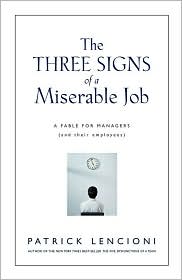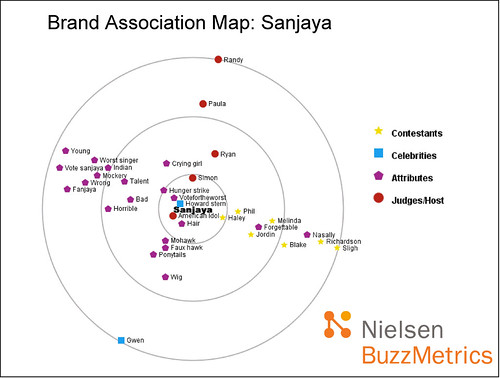
This book definitely could be taken as touchy feely. As a soft approach to management. As what managers should not waste their time with. Anytime spent on this crap is not focusing on the revenue growth or how it moves to the bottom line. Now maybe that is true, but in the services industry; restaurants, hotels, consultancies, auto-mechanics…anyone working with anyone else, other than revenue and profitability margins, customer service and satisfaction are directly or indirectly correlated to employee satisfaction and enjoyment with their job. “The dissatisfaction of employees has a direct impact on productivity, turnover, and morale, all of which eventually hit a company’s bottom line. What we learn is it’s not always about the money (or at least, just about the money).
Patrick Lencioni (the Author) proceeds to discuss how many CEO’s and professional athletes can feel the same sense of dread going to their jobs as a fry-cook or Tupperware salesman. People making millions of dollars a year can be miserable in their jobs, while some people who make little or no money can love what they do – like a volunteer or a high school volleyball coach. The author decides it is not a problem of ‘bad’ employees, that some jobs just aren’t as glamorous as others, or that if only a person made ‘x’ amount more an hour or a year- he’d be much more happy with his job.
Lencioni argues that instead, it is the manager’s job and responsibilities to not only motivate and train their employees, but to actually help them become aware of how they fit into the bigger picture. There is no reason the most adults who work over 8 hours a day at their jobs are dissatisfied. Patrick goes on to argue that the ‘Three Signs’ are Anonymity, Irrelevance, and Immeasurement. He feels that these three factors will make any job miserable, and it is the manager’s responsibility to help employees measure their contributions and find how what they do is relevant while also finding a way to be genuinely interested in their lives. People sometimes have some of one or two of these at their work but those truly happy with their jobs have a great balance and culture that addresses these issues.
Anonymity – People cannot be fulfilled in their work if they are not known. All human beings need to be understood and appreciated for their unique qualities by someone in a position of authority.
Irrelevance – Everyone needs to know their job matters, to someone. Without seeing a connection between the work and the satisfaction of another person or group of people, an employee simply will not find lasting or fulfillment.
Immeasurement – People need to be able to gauge their progress and level of contribution for themselves. They cannot be fulfilled in their work if their success depends on the opinions or whims of another person, no matter how benevolent the person may be. Without a tangible means for assessing success or failure, motivation eventually deteriorates as people see themselves as unable to control their own fate.
What is amazing about the problem and remedy that Lencioni describes is that it is effective and simple, but barely used. It seems obvious and ridiculously simple that most people might think that it doesn’t need to be said. Well it does. Everyone deserves to find fulfillment in their job and not spend their Sunday’s fretting over the upcoming week.





























